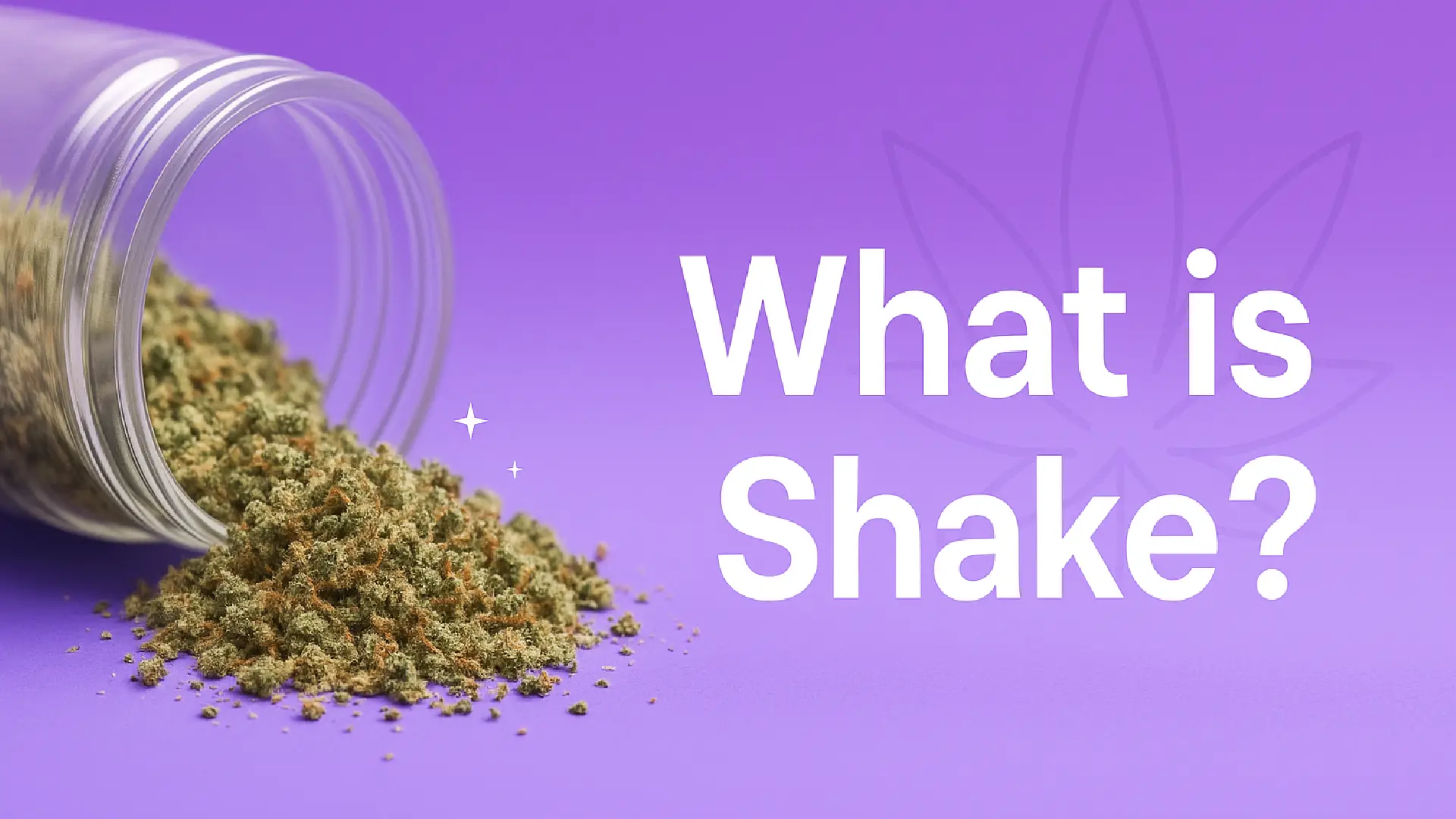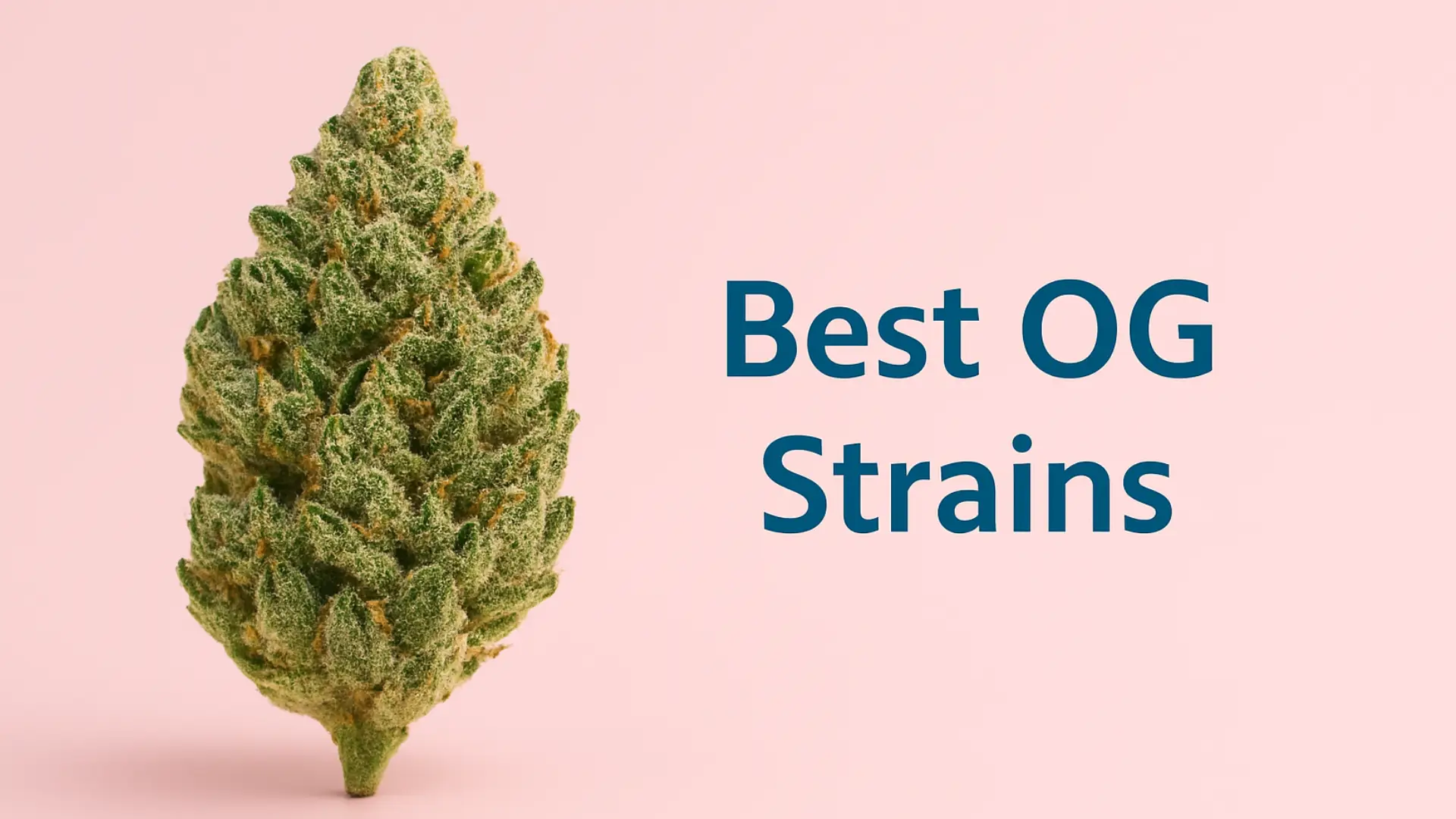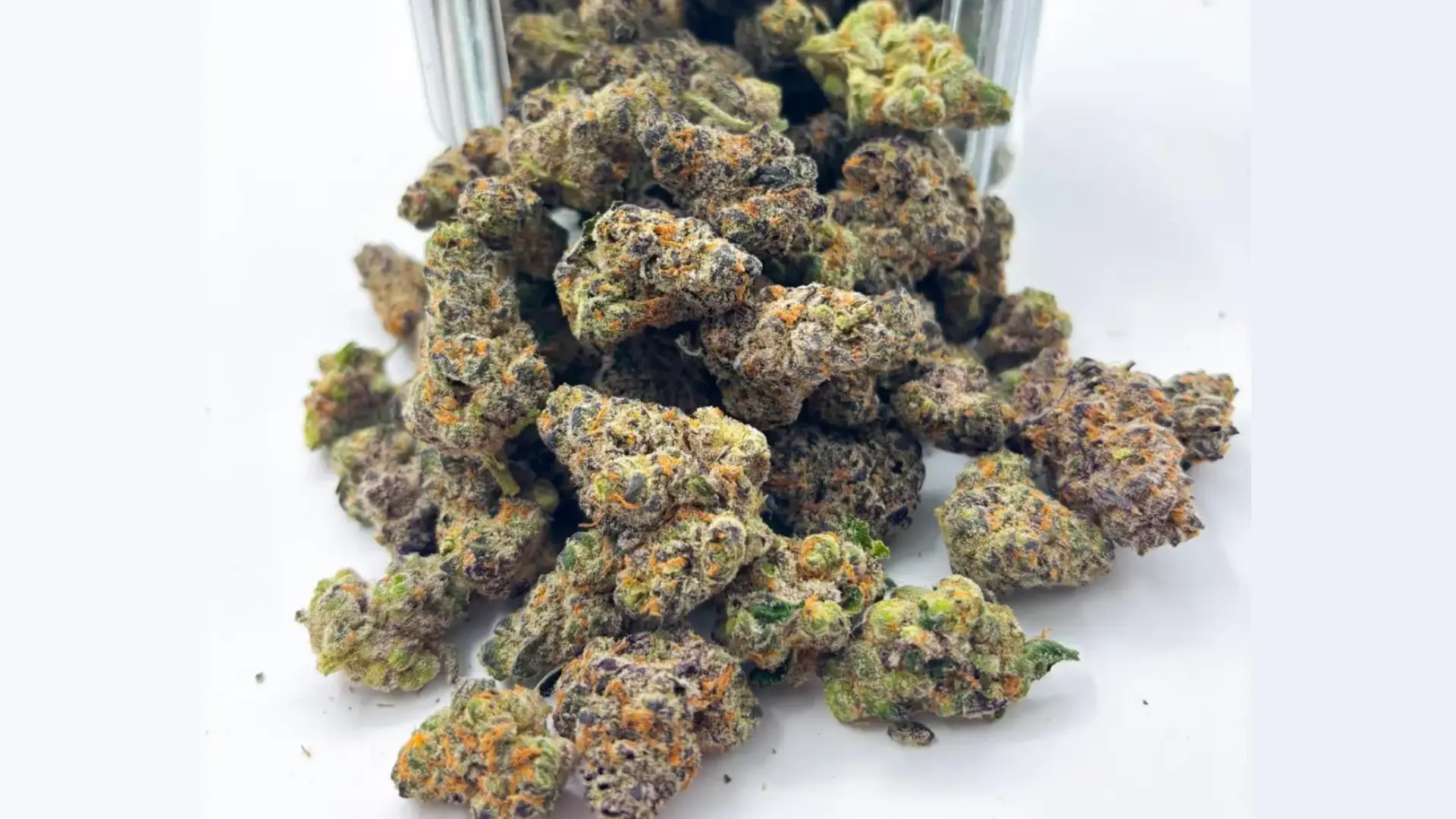Is THCA Flower really THC Flower?
THCA (tetrahydrocannabinolic acid) and THC (delta-9-tetrahydrocannabinol) are closely related cannabinoids but behave very differently in the body. THCA is non-psychoactive in its raw form, while THC is psychoactive and responsible for the euphoric “high” associated with cannabis use.
-
THCA: Non-intoxicating, studied for anti-inflammatory, neuroprotective, and anti-nausea properties (mostly in preclinical models).
-
THC: Psychoactive, with well-established medical applications such as appetite stimulation and nausea control. FDA-approved medicines containing synthetic THC (dronabinol) are used for chemotherapy-related nausea and AIDS-related anorexia.
What Is THCA? 🌿
THCA (tetrahydrocannabinolic acid) is a naturally occurring cannabinoid in raw cannabis. Chemically, it contains an extra carboxyl group, which prevents strong binding to CB1 receptors and explains why it is non-intoxicating (Moreno-Sanz, 2016; McPartland et al., 2017). As a result, THCA is non-psychoactive – consuming cannabis in its raw form won’t make you feel high.
However, THCA isn’t inactive. Preclinical studies suggest THCA may have anti-inflammatory (Palomares et al., 2020), neuroprotective, and anti-nausea properties (Moreno-Sanz, 2016), though human trials are still lacking. Potential benefits of THCA include:
- Anti-inflammatory effects: Preliminary studies suggest THCA can help reduce inflammation, which may benefit conditions like arthritis and inflammatory bowel disease.
- Neuroprotective properties: In animal research, THCA has protected nerve cells and even improved cognitive function in models of neurodegenerative diseases like Alzheimer’s. This hints at potential use for conditions such as Parkinson’s or dementia (though human research is needed).
- Antiemetic (anti-nausea) benefits: THCA appears to ease nausea and vomiting, which could aid patients undergoing chemotherapy or experiencing chronic nausea.
- Non-psychoactive relief: Because it does not produce a high, THCA allows patients to seek symptom relief (for pain, inflammation, etc.) while remaining clear-headed and functional. For example, THCA can ease pain or nausea without the intoxication.
Keep in mind that research on THCA is still in early stages. Most findings above come from cell or animal studies; more human clinical research is needed to fully understand THCA’s benefits and optimal uses. Still, its promise as a cannabinoid that delivers cannabis’s therapeutic perks without impairment has many people interested in raw cannabis remedies and THCA-infused products.
What Is THC? 🔥
THC (delta-9-tetrahydrocannabinol) is the most recognized cannabinoid, responsible for the psychoactive effects of cannabis through CB1 receptor activation (PubChem, 2025; NIDA, 2024). It alters perception, mood, and cognition.
Medical applications supported by clinical research:
- Pain relief for chronic conditions.
- Nausea control: Synthetic THC (dronabinol, brand name Marinol®) is FDA-approved for chemotherapy-induced nausea.
- Appetite stimulation: Dronabinol is also approved for AIDS-related anorexia.
- Other uses: Muscle relaxation, sleep aid, and anxiety relief at lower doses.
Potential drawbacks of THC:
- Short-term memory issues, impaired coordination, and increased heart rate.
- Anxiety or paranoia in some users, especially at higher doses.
- Legal restrictions vary by jurisdiction.
Even though THCA and THC originate from the same plant and molecule, they have distinct profiles in terms of effects, benefits, and downsides. Below is a side-by-side comparison of key differences:
In summary: THCA provides a way to potentially leverage cannabis’s health benefits without the high, but it’s less researched and must remain unheated to preserve its form. THC is well-known, with strong evidence for certain medical uses and, of course, notable recreational effects – yet it comes with the downsides of intoxication and legal restrictions. Which is “better” depends on the context and user needs, as we’ll explore next.
How to Choose Between Them
Choosing between THCA and THC will depend on your goals, medical needs, and personal situation. Here are some use-case scenarios to consider:
If you want medicinal benefits without the high: THCA might be the preferable choice. For example, someone with chronic inflammation or mild pain who needs to stay alert could use a THCA tincture or raw cannabis smoothie to reduce symptoms without feeling impaired. THCA delivers anti-inflammatory or anti-nausea effects while you remain clear-headed. This can be ideal for daytime treatment of conditions like arthritis, where you want relief (less pain and swelling) but need to work or drive without impairment.
If you seek a recreational high or stronger symptomatic relief: THC is the compound you’ll need. Recreational users and patients requiring significant pain relief or appetite stimulation will benefit most from THC’s pronounced effects. For instance, a cancer patient with severe nausea and appetite loss may find more relief from a THC-rich edible or vapor because THC directly activates appetite and alleviates nausea. Likewise, those looking to experience euphoria, relaxation, or stress relief for enjoyment will require THC, as raw THCA won’t provide those intoxicating effects.
For anxiety or sensitivity to THC’s effects: Consider THCA (or CBD) instead of THC. THC’s psychoactive nature is a double-edged sword for anxiety – in low doses it might relax, but in higher doses it can trigger anxiety, panic, or paranoia in susceptible individuals. If you know you’re sensitive to THC or have anxiety issues, THCA offers a non-psychoactive alternative that won’t spike your heart rate or cause racing thoughts. While research is still emerging, using THCA (which doesn’t directly bind CB1 receptors) could avoid the anxiety-provoking side effects some experience with THC.
For pain management and sleep: Both cannabinoids have roles, but consider the type of relief needed. THC has well-documented analgesic (painkilling) properties and can induce sleepiness, which is helpful for severe pain or insomnia at night (THCA vs THC: An In-Depth Analysis of Their Differences). THCA may help with pain that stems from inflammation (for example, joint pain or autoimmune flare-ups) without sedating you. Some users report success using raw THCA during the day for mild pain, then THC at night for deeper pain relief and sleep. If pain is extreme or neuropathic, THC’s direct activation of brain receptors might offer more relief. If pain is moderate and you wish to avoid side effects, THCA is worth a try.
Legal availability: In areas where THC (cannabis) is illegal, you might be tempted to use THCA products derived from hemp (since hemp flower under 0.3% Δ⁹-THC can be sold openly). Some people do purchase “THCA hemp” flower as a workaround – it’s legally sold as long as it has very low THC at point of sale, then they smoke it to convert THCA to THC for a high (What Is THCA?). Caution: This can be legally risky. Even if THCA is legal to buy, when you heat it into THC you may be violating the law. Always understand your local regulations. If you genuinely need a non-intoxicating product, use THCA as intended (unheated); if your goal is to get THC, it’s best to obtain it through legal channels where possible.
Ultimately, match the cannabinoid to your use case. For a medical patient seeking purely therapeutic effects (and especially if they cannot tolerate impairment or need to function), THCA offers a novel solution. For a recreational user or a patient requiring strong relief, THC is the established route. Some individuals even incorporate both: e.g. raw cannabis juice in the morning (THCA) and a THC-based edible at night, depending on their needs.
Ordering THCA Online in Legal States 🛒
In states where hemp-derived THCA remains compliant under the 2018 Farm Bill, you can legally order THCA flower online from certified retailers. Reputable sources, like BakeBoxx, provide lab-tested THCA flower that ships discreetly to qualifying states. Always confirm your local laws before purchasing, since regulations are changing rapidly nationwide.
🤔 Frequently Asked Questions
Is THCA legal to buy online?
Yes, many THCA products are sold legally if derived from hemp and tested below 0.3% Δ⁹-THC.
Is THCA psychoactive?
No. Its chemical structure prevents strong binding to CB1 receptors, so it does not cause a “high” .
Is THCA legal?
Depends on jurisdiction. Federally, hemp products must test at ≤0.3% total THC. Some states restrict THCA products .
Does THCA show up on drug tests?
Standard workplace tests look for THC metabolites (THC-COOH). Whether THCA products lead to a positive result depends on the type of test and how the product is used.
What is THC used for medically?
Synthetic THC (dronabinol) is FDA-approved for AIDS-related anorexia and chemotherapy-related nausea.
What’s the best way to consume THCA without getting high?
Try THCA tinctures or raw cannabis smoothies. Avoid smoking or heating the product to preserve the non-psychoactive form.
Which Flower Should You Choose?
THCA and THC each have a place in the cannabis world, and understanding their differences helps you make informed choices. THCA is ideal when you want the potential health benefits of cannabis without feeling high, and you are not in a recreational state. On the other hand, THC is the go-to when you desire pronounced effects, whether for recreation (enjoying the high) or for acute medical symptoms that benefit from its potency.
When shopping for cannabis products, keep these tips in mind:
- Read the labels: Check whether a product is high in THCA or THC. If it’s a raw THCA product (like a tincture, capsule, or THCA isolate), it should be lab-tested to confirm it contains THCA and minimal THC. Reputable products will list the percentages of THCA vs. THC. This is crucial because some unregulated “hemp” products have been found to actually contain high THCA (essentially making them marijuana) beyond legal limits.
- Handle and store properly: To preserve THCA, use the product as directed (often orally or topically) and avoid heating it. For example, don’t smoke a THCA tincture expecting to keep it non-psychoactive – that defeats the purpose. Similarly, store raw cannabis or THCA products away from light and heat to prevent accidental decarboxylation.
- Legal and safety considerations: Ensure that whatever you choose is legal in your jurisdiction. THC products should be purchased through legal dispensaries or prescription programs where available, to ensure quality and compliance. If you opt for THCA, be aware of the local law – even though THCA itself may not be scheduled, its easy conversion to THC means authorities may treat it like THC (DEA Says 'THCA Does Not Meet The Definition' Of Legal Hemp As Congress Weighs Cannabinoid Recriminalization In Farm Bill - Marijuana Moment). Also, keep any cannabis products out of reach of children and pets for safety.
References
McPartland, J. M., Duncan, M., Di Marzo, V., & Pertwee, R. G. (2017). Are cannabidiol and Δ9-tetrahydrocannabivarin negative modulators of the endocannabinoid system? Frontiers in Pharmacology, 8, 422. https://doi.org/10.3389/fphar.2017.00422
➡️ Evidence: Weak CB1 binding for THCA, supporting non-psychoactivity.
Moreno-Sanz, G. (2016). Can you pass the acid test? Critical review and novel insights on Δ9-tetrahydrocannabinolic acid A. Cannabis and Cannabinoid Research, 1(1), 124–130. https://doi.org/10.1089/can.2016.0009
➡️ Evidence: Reports anti-nausea effects of THCA in preclinical studies.
National Center for Biotechnology Information. (2025). PubChem Compound Summary for CID 16078, Delta-9-THC. National Institutes of Health. https://pubchem.ncbi.nlm.nih.gov/compound/Delta9-THC
National Institute on Drug Abuse. (2024). Marijuana DrugFacts. https://nida.nih.gov/publications/drugfacts/marijuana
Palomares, B., et al. (2020). Δ9-THCA-A modulates CB1 receptors through the orthosteric and allosteric sites: Anti-arthritis activity. British Journal of Pharmacology, 177(21), 4996–5012. https://doi.org/10.1111/bph.15155
➡️ Evidence: Demonstrates anti-inflammatory and anti-arthritis activity in preclinical models.





